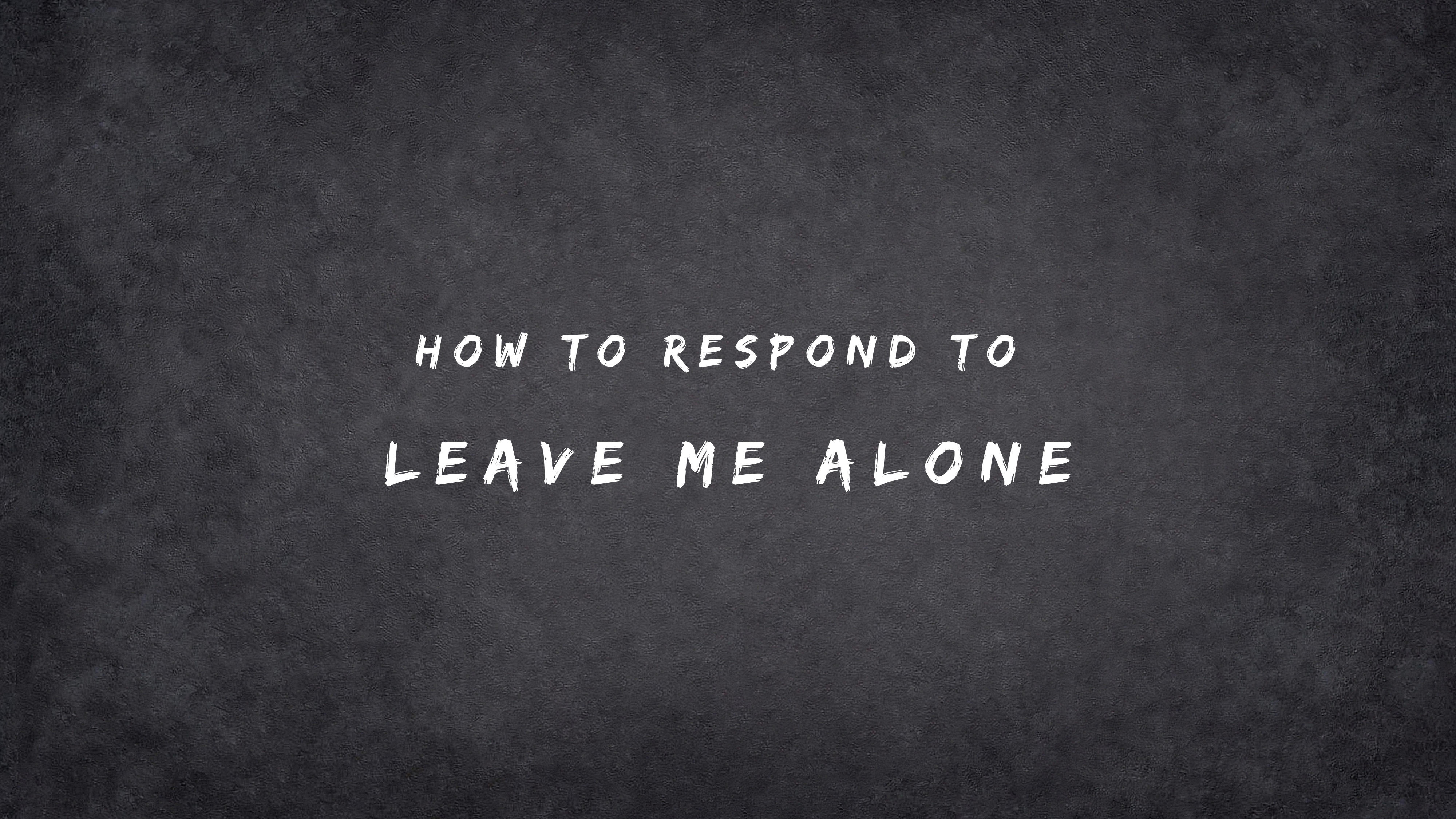We’ve all encountered the phrase “Leave me alone” at some point. Whether from a friend, family member, or colleague, this statement can stir up various emotions. It can be confusing and even hurtful, but understanding how to respond appropriately is key to maintaining healthy relationships and personal boundaries. Let’s explore how to handle this situation with grace and respect.
Assessing the Situation
Identifying the Tone and Intent
Before you respond, it’s crucial to assess the tone and intent behind the request. Is the person genuinely upset, or are they joking? The context will guide how you approach the situation.
- Angry or Upset? If the person seems genuinely angry or upset, it’s essential to tread carefully. Their request likely stems from strong emotions, and addressing these emotions thoughtfully can prevent escalation.
- Playful or Joking? Your response can be more casual if the request seems light-hearted or playful. Ensure you’re not misinterpreting the situation, which could lead to misunderstandings.
Evaluating Your Relationship with the Person
The nature of your relationship will also influence your response.
- Close Friend or Acquaintance? If the person is a close friend, you may have more leeway to respond personally and directly. For acquaintances, a more neutral response might be appropriate.
- Professional or Personal Context? In a professional setting, maintaining a respectful tone is crucial. In personal relationships, you might have more flexibility to address the request emotionally.

150+ Replies To “Leave Me Alone”
Respectful Acknowledgment
- Got it. I’ll give you the space you need.
- Understood. I’ll step back and let you have your time.
- I hear you. I won’t bother you anymore.
- Okay, I’ll respect your request and keep my distance.
- I understand you need some alone time. I’ll leave you be.
- I’ll give you the space you’re asking for. Take care.
- I respect your wishes. I’ll make sure not to intrude.
- Understood. I won’t reach out further.
- I’ll step away as you’ve asked. Let me know if you need anything.
- I hear you loud and clear. I’ll stay out of your way.
Clarification Seeking
- I’m sorry if I’m bothering you. Is there something specific that’s troubling you?
- I respect your need for space. Could you let me know if there’s anything I can do differently?
- I understand you want to be left alone, but is there something more you want to talk about?
- I hear you. To ensure I’m not overstepping, is there anything you’d like to discuss?
- Okay, I’ll give you space. Is there a particular reason you need this right now?
- I’ll step back as you’ve requested. If there’s a specific issue, I’d like to understand it better.
- I respect your wishes for distance. Feel free to let me know if there’s something specific on your mind.
- I understand you want solitude. Can you tell me if there’s something specific that prompted this?
- I’ll stay out of your way. If there’s a particular reason you’re feeling this way, I’d like to understand.
- I got it. Is there something I should be aware of if you’re comfortable sharing?
Apologetic
- I’m sorry if I’ve upset you. I’ll give you the space you need.
- I didn’t mean to intrude. I’ll leave you alone and hope we can talk later.
- My apologies for bothering you. I’ll step back and respect your space.
- I’m sorry if I’ve caused any frustration. I’ll make sure not to contact you further.
- I didn’t realise I was overstepping. I’ll give you the space you need.
- I’m sorry for any inconvenience I may have caused. I’ll back off now.
- I didn’t intend to upset you. I’ll stop reaching out and give you some time.
- I apologise if I’m intruding. I’ll respect your request for space.
- Sorry if I’ve been a bother. I’ll make sure not to intrude any further.
- I’m sorry if I’ve been overbearing. I’ll leave you alone as requested.
Concerned or Caring
- I’ll give you space, but I’m here if you need someone to talk to.
- I understand you want to be alone. Just know I’m here for you whenever you’re ready.
- I’ll step back, but please don’t hesitate to reach out if you need anything.
- I get it; I’ll leave you alone for now. But if you need a friend, I’m just a call away.
- I’ll respect your wishes. Just know that I care and am here if you need me.
- I’m sorry if I’ve pushed too much. I’ll give you space, but I’m here if you need anything.
- I’ll let you be, but I’m concerned about you. Reach out if you need someone to listen.
- I understand. I’ll give you the space you need, but remember, I’m here when you’re ready.
- I’ll back off now, but I hope you know I’m always here for you.
- I’ll give you space, but please take care of yourself. I’m here if you need me.
Defensive or Conflicted
- I’m just trying to help, but if you need space, I’ll give it to you.
- I didn’t mean to upset you. If you want me to back off, I will.
- I’m sorry if I’ve been too much. I’ll give you space, but it’s hard not to worry.
- I thought I was helping, but if you want to be left alone, I’ll respect that.
- I’m trying to be there for you, but I’ll step back if that’s not what you want.
- I’ll leave you alone, but I only tried to be supportive.
- If you need space, I’ll respect that, but I want you to know I care.
- I didn’t mean to intrude. I’ll step away, but I hope we can talk later.
- I’ll give you the space you’re asking for, but it’s hard for me to do that when I care so much.
- I’ll back off, but I’m only doing this because I want what’s best for you.
Humorous or Light-hearted
- Alright, I’ll give you space. But if you need me, I’ll be in my ‘thinking spot’—the couch.
- I got it! I’ll be as quiet as a ninja. Just don’t forget I’m here if you need backup.
- Okay, I’ll leave you alone. Just don’t be surprised if I pop up in your notifications later!
- Understood. I’ll disappear like a magician, but I promise not to pull any tricks!
- Alright, I’ll give you space. If you need me, I’ll be over here talking to myself.
- Got it; I’ll vanish into the background like a ninja in a smoke bomb. You know where to find me!
- Sure, I’ll give you some space. I’ll practice my ‘leaving you alone’ skills.
- Okay, I’ll leave you alone, but I can’t guarantee I won’t miss you!
- Alright, I’ll go into stealth mode now. You won’t even know I’m around—until you need me!
- Got it, I’ll give you space. Just don’t be surprised if I come back with snacks!
Passive-Aggressive
- Fine, I’ll leave you alone. Don’t worry about me.
- Okay, I’ll disappear like always when I’m not needed.
- Sure, I’ll back off. I wouldn’t want to bother you with my presence.
- No problem, I’ll just go somewhere else. I’m not wanted here.
- Alright, I’ll leave you alone. It’s not like I was trying to help or anything.
- I got it. I’ll stop caring. It’s obviously what you want.
- Okay, I’ll leave you alone. I hope that fixes everything.
- Sure, I’ll give you space. I wouldn’t want to interrupt your peace.
- Fine by me. I’ll just go ahead and do my own thing, too.
- Alright, I’ll back off. Sorry for being around too much, I guess.
Neutral or Non-committal
- Okay, I’ll give you space.
- I got it. I’ll leave you alone for now.
- Alright, I’ll step back.
- Sure, I’ll give you some time.
- Okay, I’ll stay out of your way.
- Alright, I’ll stop bothering you.
- I understand. I’ll leave you to it.
- Okay, I won’t reach out anymore.
- Sure, I’ll respect your request.
- I got it. I’ll give you the distance you need.
Reflective or Thoughtful
- I’ll respect your need for space. I hope we can talk about what’s going on when you’re ready.
- I understand you need some time alone. I’ll give you that space, and when you’re ready, we can sort things out.
- I’ll leave you alone for now. When the time feels right, I hope we can discuss your thoughts.
- I’ll step back and give you the space you need. I just hope we can connect when things feel calmer.
- I hear you, and I’ll give you space. Whenever you’re ready, I’m here to talk.
- I’ll respect your wishes and leave you alone. I hope we can have an open conversation when you feel up to it.
- I’ll step away and give you time. I just hope that when you’re ready, we can address whatever’s on your mind.
- I’ll give you space. Take your time; if you ever want to share what’s happening, I’ll be here.
- I’ll respect your need for distance. I just hope we can have an honest talk when you’re ready.
- I understand that you need space. When you’re ready, I’d like to hear your thoughts on everything.
Reassuring
- I’ll give you space, but I’m here if you need anything.
- I understand, and I’ll back off for now. If you change your mind, I’m just a message away.
- I’ll leave you alone, but I’m always around if needed.
- No worries, I’ll give you some time. I’m here whenever you’re ready to talk.
- I respect your need for space. Just remember, I’m here if you ever want to chat.
- Okay, I’ll step back. I’m just a call away if you want to talk later.
- I understand you need some time alone. I’ll be here when you’re ready.
- Take all the time you need. I’ll be around whenever you’re ready to reconnect.
- I’ll give you your space but don’t hesitate to ask if you need anything.
- I’ll leave you alone for now. Whenever you’re ready, I’ll be here.
Affirmative but Curious
- Alright, I’ll give you space. Is there anything specific that’s bothering you?
- Got it; I’ll back off. I’m just curious: is there something that triggered this?
- Okay, I’ll respect your wishes. Is there something on your mind that you’d like to share later?
- I’ll leave you alone. If there’s something I did, I’d like to understand better.
- Sure, I’ll step back. Is there something I can do differently in the future?
- I’ll give you the space you need. Is there a particular reason you’re feeling this way?
- Okay, I’ll give you some time. I’d like to know what’s going on when you’re ready.
- I got it; I’ll stop reaching out. Is there anything you want to talk about when you’re ready?
- I’ll respect your space. I was just wondering if there is anything I should be aware of.
- I’ll give you your time alone. I’m here if you feel like sharing what’s bothering you later.
Formal or Professional
- I acknowledge your request and will respect your privacy moving forward.
- Understood. I’ll refrain from further contact as requested.
- I’ll respect your need for space. Please let me know if there’s anything else I can do.
- I’ll step back as requested. If there’s anything you need, feel free to reach out.
- I understand. I’ll stop contacting you and respect your boundaries.
- Your request has been noted. I’ll give you the space you’ve asked for.
- I’ll respect your need for distance. Should you require assistance in the future, feel free to reach out.
- I understand your need for space and will act accordingly. Please let me know if anything changes.
- I’ll respect your wishes and refrain from further communication.
- I acknowledge your request and will give you the space you need. Let me know if you need anything.
Empathetic
- I get it. I’ll give you the space you need. I’m here if you want to talk later.
- I completely understand. Sometimes, we all need a break. Reach out whenever you’re ready.
- I hear you. I’ll step back for now. Just know that I’m here whenever you need me.
- I understand. Take all the time you need; I’ll be here when you’re ready to connect again.
- I know things can get overwhelming. I’ll give you space, but I’m always here for you.
- I get it. I’ll leave you alone, but remember, I’m here when you’re ready.
- It’s okay, I understand. We all need our space sometimes. I’m here when you’re ready.
- I can imagine how you’re feeling. I’ll give you the space you’re asking for.
- I understand that you need some alone time. I’ll be here if you want to talk later.
- I get that you need space right now. Just know I’m here for you whenever you’re ready.
Direct and Brief
- Okay.
- Understood.
- I got it.
- Alright.
- Sure.
- No problem.
- Noted.
- Okay, I will.
- Understood, I’ll leave you be.
- Got it; I’ll step back.
Encouraging Future Communication
- I’ll leave you alone, but I hope we can talk again when ready.
- I’ll give you space, and whenever you’re ready to chat, I’m here.
- I’ll respect your wishes for now, but please don’t hesitate to reach out when you feel like it.
- I understand. I’ll be here whenever you want to talk again.
- I’ll step back for now, but I’m always available when you want to reconnect.
- I’ll give you your space, but I look forward to hearing from you whenever you’re ready.
- I’ll leave you alone for now. Just know that the door is always open when you want to talk.
- I got it. I’m here whenever you feel like talking again.
- I’ll respect your space, and I hope we can catch up when you’re ready.
- I’ll back off for now, but I’m always here whenever you can reconnect.
Crafting Your Response
Respect Their Space
One of the most important aspects of responding to “Leave me alone” is to respect their request. This shows maturity and understanding.
- Acknowledging Their Request A simple acknowledgement can go a long way. For instance, saying, “I hear you, and I’ll give you some space,” shows that you respect their feelings without taking them personally.
- Giving Them Space Without Taking Offense It’s easy to feel hurt by this request, but remember, it’s often more about their current state than a reflection of your relationship. Give them the space they need; don’t take it as a personal affront.
Communicating Clearly
Clarity in communication helps avoid further confusion or conflict.
- Using “I” Statements: Frame your response using “I” statements to express your feelings without sounding accusatory. For example, “I feel hurt by your request, but I understand you need space right now.”
- Keeping Your Response Brief and Direct A concise response prevents adding more fuel to the fire. You don’t need to over-explain—just acknowledge and move forward.
Examples of Responses
When the Request is from a Friend
A friend’s request to be left alone can be tricky. Here are some ways to handle it:
- Simple and Supportive Responses: “I understand you need some time alone. I’m here if you want to talk later.” This shows empathy without pushing them to explain their feelings right away.
- Offering to Talk Later “I’ll give you space now. Let’s catch up when you’re ready.” This approach respects their need for solitude while keeping the door open for future communication.
When the Request is from a Colleague or Boss
In a professional context, your response should be respectful and straightforward:
- Professional and Respectful Responses “I understand. I’ll make sure not to interrupt you. Let me know if there’s anything I can do to support you.”
- Setting Boundaries Without Creating Tension “I’ll step back for now. Feel free to reach out if you need anything or want to discuss this further.”
When to Revisit the Conversation
Timing Matters
If you need to revisit the conversation, timing is crucial.
- Choosing the Right Moment: Wait until the person seems more receptive. For example, if they’ve had time to cool off or if you see them in a more relaxed state, that might be a good time to check-in.
- Re-engaging: Gently Approach the conversation softly, acknowledging their need for space and expressing your willingness to listen. “I just wanted to check-in. If you’re ready to talk, I’m here.”
Seeking Resolution or Understanding
Sometimes, underlying issues need to be addressed.
- Addressing Underlying Issues If the request to be left alone is part of a larger issue, addressing it calmly and openly can lead to resolution. “I noticed you asked for space earlier. Is there something we need to talk about?”
- Apologizing if Necessary If your actions contributed to their frustration, a sincere apology can help mend the situation. “I’m sorry if I’ve done something to upset you. I’ll make sure to be more mindful.”
Conclusion
In conclusion, knowing how to respond when someone says, “Leave me alone” can be challenging, but assessing the situation, respecting boundaries, and choosing your words carefully are important. Whether you respond with empathy, humor, or assertiveness, the key is to remain calm and considerate. Keep these 150+ responses in mind for various situations, and remember that every interaction is an opportunity to grow in communication. If you’re looking for more smart ways to respond in everyday conversations,
Check out our guide on:
150+ Smart Responses for “They Are Growing Up So Fast.”
FAQs
Q. What if I Feel Hurt by Their Request?
It’s natural to feel hurt, but try to separate their request from your personal feelings. Give them the space they need, and consider addressing your feelings later.
Q. How Do I Know If I Should Give Them Space?
If their request seems genuine and they appear distressed or overwhelmed, giving them the space they need is best. Respecting their boundaries shows empathy and consideration.
Q. Can I Respond if I’m Upset?
Yes, but keep your response brief and focused on acknowledging their request. Save detailed discussions about your feelings later when they’re more receptive.
Q. How Do I Approach Someone Who Frequently Says “Leave Me Alone”?
It may be worth addressing the underlying cause if this is a recurring issue. Have an open conversation about the reasons behind their requests and try to find a mutually agreeable solution.
Q. What Are Some Tips for Managing Conflict in These Situations?
Practice active listening, remain calm, and communicate openly. Understanding their perspective and respectfully expressing your feelings can help resolve conflicts effectively.











Techno rozen I very delighted to find this internet site on bing, just what I was searching for as well saved to fav
Nutra Gears I like the efforts you have put in this, regards for all the great content.
Nutra Gears Good post! We will be linking to this particularly great post on our site. Keep up the great writing